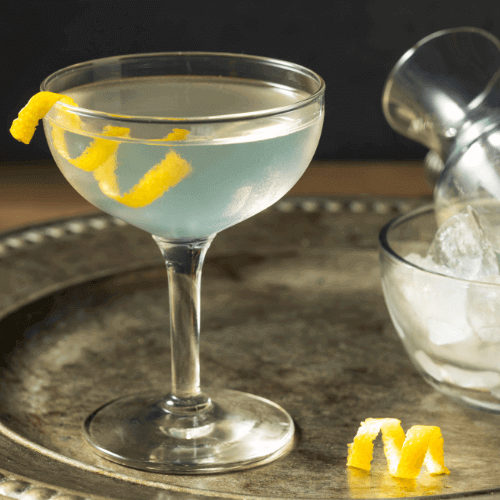Table of Contents The Mezcal Manhattan is a delightful riff on the classic Manhattan cocktail. The Mezcal Manhattan swaps out...

The Tuxedo cocktail is often described as a “martini style” drink, emphasizing its sophistication and classic appeal. Like the martini, it features a base spirit (usually gin), enhanced by a combination of vermouth and other ingredients. However, what sets the Tuxedo apart are its unique additions.
The classic Tuxedo cocktail typically includes gin, dry vermouth, Maraschino liqueur, and a touch of absinthe. This combination creates a complex and well-balanced flavor profile, with the herbal notes of absinthe complementing the botanicals of gin, while the Maraschino liqueur adds a hint of sweetness. The drink is garnished with a lemon twist or cherry, adding a touch of elegance and aroma.
The origins of the Tuxedo cocktail are somewhat elusive, and like many classic cocktails, it has undergone numerous variations over the years. While it is difficult to pinpoint the exact moment of its creation, it is widely believed to have gained prominence in the late 19th century. Its inclusion in Harry Johnson’s Bartenders’ Manual in 1900 solidifies its existence in the mixology world at that time.
One theory regarding the cocktail’s name suggests that it was inspired by the Tuxedo Club, a prestigious social club in Tuxedo Park, New York. The club’s formal dress code may have inspired the name, hinting at the cocktail’s elegant and refined nature. However, some argue that the cocktail’s true origins are rooted in the Waldorf-Astoria Hotel in New York City, where it was popularized and underwent variations.
While the Tuxedo cocktail is often referred to as a “martini style” drink, it bears more similarities to another classic cocktail: the Turf Club. The Turf Club cocktail, like the Tuxedo, features gin as its primary spirit and includes vermouth, Maraschino liqueur, and absinthe. The key difference between the two lies in the proportions and preparation.
The Tuxedo cocktail typically calls for equal parts gin and dry vermouth, with smaller quantities of Maraschino liqueur and absinthe. In contrast, the Turf Club cocktail features a higher ratio of gin to vermouth, making it a slightly drier option.
45 ml Gin
45 ml Dry vermouth
7.5 ml Maraschino liqueur
2 dashes of Orange bitters
1 dash Absinthe
Ice
Garnish: a lemon twist

Rinse the inside of a coupe glass with a dash of absinthe.
In a mixing glass filled with ice: add the gin, dry vermouth, maraschino liqueur, and orange bitters.
Stir, until chilled.
Strain the mix into the coupe glass.
Garnish with a lemon twist.
Harry Johnson’s Bartenders’ Manual is an essential cornerstone in the history of mixology. Johnson was a trailblazer in the world of bartending, and his manual revolutionized the profession. In this comprehensive tome, he meticulously documented cocktail recipes, techniques, and bar management tips, providing an invaluable resource for bartenders and enthusiasts alike.
The Tuxedo cocktail’s inclusion in the manual solidified its place in cocktail lore. Johnson’s precise instructions and expert guidance ensured that the Tuxedo would be enjoyed by generations to come. He emphasized the importance of balance and precision in cocktail making, principles that continue to guide bartenders to this day. Thanks to Johnson’s manual, the Tuxedo cocktail has retained its original charm and sophistication over the years.
Table of Contents The Mezcal Manhattan is a delightful riff on the classic Manhattan cocktail. The Mezcal Manhattan swaps out...
Facebook Print Email WhatsApp Table of Contents The Margarita, in general, holds a special place in the hearts of cocktail...
Facebook Print Email WhatsApp Published: 02/12/24 Table of Contents The Emerson is a classic cocktail made with gin, sweet vermouth,...
Facebook Print Email WhatsApp Published: 01/25/24 Table of Contents The evolution of classic cocktails often hinges on nuanced modifications that...
MixDrinkiPedia.com is a participant in the Amazon.com Services LLC Associates Program. As an Amazon Associate we earn from qualifying purchases. Amazon and the Amazon logo are trademarks of Amazon.com, Inc. or its affiliates.